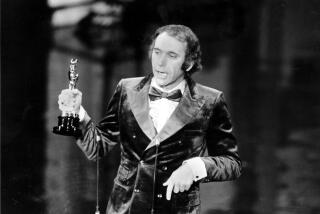Longtime Collaborator of Billy Wilder : I. A. L. Diamond; Oscar-Winning Writer
- Share via
I. A. L. Diamond, whose initials stood for nothing in particular but whose screen-writing credits amounted to a great deal, died of cancer Thursday at his Beverly Hills home.
The Oscar-winning (“The Apartment”) longtime collaborator of writer-director Billy Wilder was 67.
Born Itek Dommnici in Ungheni, Romania, Diamond came to this country when he was 9. His father, a grocer, had preceded him to New York, where he was raising his family in the Crown Heights section of Brooklyn.
Wrote School Shows
Young “Iz” showed an early propensity for mathematics and won a three-state competition which propelled him into Columbia University. Although a mathematics major, he was chosen as a freshman to write the school’s varsity shows--both book and lyrics--a feat he repeated annually through his senior year. Diamond’s wife, Barbara, said her husband was the first student to ever write four consecutive student revues. Those successes and his editorship of the university newspaper directed him away from figures and toward letters.
He came to the attention of Paramount Studios, which brought him to Hollywood in 1940. His first screen credit was, “Murder in the Blue Room” in 1944, followed by “Never Say Goodbye,” “The Girl From Jones Beach,” “That Certain Feeling” and several others.
Wilder said he became aware of Diamond’s talent and talked to the writer’s agent, Irving (Swifty) Lazar. That meeting resulted in the first of the classic Diamond-Wilder comedies, “Love in the Afternoon,” in 1957.
When their 30-year affiliation ended with Diamond’s death, their shared credits included “Merry Andrew,” “Some Like It Hot” (an Oscar nomination), “The Apartment,” “One Two Three,” “Irma La Douce,” “Kiss Me Stupid,” “The Fortune Cookie” (a second nomination), “The Private Life of Sherlock Holmes,” “Avanti!” “Fedora” and “Buddy Buddy.”
Alone, Diamond adapted the Abe Burrows play “Cactus Flower” to the screen in 1969.
In an interview last year with People magazine commemorating Hollywood’s 100th year, Diamond decried what he saw as a lack of talent writing for the screen.
“There are no writers left in this business; there are only would-be directors (who) have learned that the best way to get a crack at directing . . . is to write a script,” he said. “But most don’t have the vaguest talent as writers. They see writing as a phase they have to pass through, like adolescent acne. . . .
“More directors have ruined their careers by writing their own scripts than by fooling around with the leading lady.”
Makes an Exception
In another reflective interview, this one coming years earlier with The Times, he was asked who was of more value to a project--the writer, the actor or the director. Diamond predictably chose the writer, adding succinctly that “directors can’t direct and actors can’t act without a screenwriter.”
But Wilder, who once said, “If I ever lost this guy (Diamond) I’d be like Abercrombie without Fitch,” was an exception that Diamond quickly added.
“Billy,” said his longtime friend, “is a writer who is also a director.”
In addition to his wife, Diamond is survived by a son, a daughter and one grandchild. In lieu of flowers, contributions in Diamond’s name are asked to the Friends of the Beverly Hills Public Library.
More to Read
Only good movies
Get the Indie Focus newsletter, Mark Olsen's weekly guide to the world of cinema.
You may occasionally receive promotional content from the Los Angeles Times.










